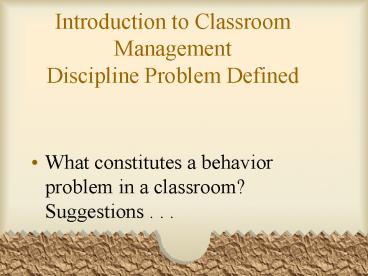Introduction to Classroom Management Discipline Problem Defined PowerPoint PPT Presentation
1 / 19
Title: Introduction to Classroom Management Discipline Problem Defined
1
Introduction to Classroom Management Discipline
Problem Defined
- What constitutes a behavior problem in a
classroom? Suggestions . . .
2
Is this OK in your class?
3
- Negative teacher behavior is ineffective in
helping children learn appropriate behavior
(Levin Nolan, 2004, p. 20). - What types of student behaviors constitute
discipline problems?
4
Behavior ?
- Disruptive Behavior
- Misbehavior
- Maladaptive Behavior
- Misbehavior is any student or teacher or
parent or administrator or trustee behavior that
interferes with teaching (Levin Nolan, 2004,
p. 21).
5
- Discipline Defined A discipline problem is
behavior that (1) interferes with the teaching
act, (2) interferes with the rights of others to
learn, (3) is psychologically or physically
unsafe, or (4) destroys property (Levin
Nolan, 2004, p. 23). - How does our Education Act define it?
6
Times have changed!
- Crime and vandalism is different from common
misbehavior such as off-task and disruptive
classroom behaviors. Crime and routine
classroom misbehavior are inherently different
problems that require different solutions
(Levin Nolan, 2004, p. 28). Remember You are
not the police!
7
All teachers must be able to. .
- defuse . . . Situations and direct students
toward more prosocial means of conflict
resolution (Levin Nolan, 2004, p. 29). - Conflict management training - For all!
- Non-violent conflict resolution - For all!
8
Good Staff Good Days
9
Your role Be perceptive!
- Observe as a referee would. Make the call! Assert
yourself! Be proactive. - Why - Because disruptive behavior can result in a
ripple effect. In other words, students learn
misbehavior from observing other children.
10
Remember
- Rough and threatening behavior causes student
anxieties which lead to additional disruptive
behaviors from onlooking students (Levin
Nolan, 2004, p. 30-31). - No threats, violence, vandalism at school?
- Is this possible?
- Students witness bullying, robbery, assault,
victimized avoidance of school!
11
We are emotionally vulnerable !
- Impact changes in teacher attitudes
- Personal feelings impact students!
- Result - differential treatment is fueled by
negative beliefs and feelings many teachers have
toward disruptive students (Levin Nolan, 2004,
p. 31).
12
Help - I give up!
13
Fight or Flight!
14
Focus on the good!
- . . . Studies have concluded that teachers are
much more likely to reprimand inappropriate
behavior than to approve of appropriate behavior
when interacting with disruptive students
(Levin Nolan, 2004, p. 32). - You can choose to be different!
15
Standards
- Work towards one standard for all.
- Ensure that your standards are realistic.
- Fair standards are well received.
- Disruptive students need a chance to learn new
behaviors. - Small, manageable steps.
16
More problems sadness
- You might try to get even with students.
- You might say I dont care.
- You might look for revenge.
- Power struggles develop in class.
- Stress increases 3 options
- Face it, leave teaching, do nothing
17
Perplexed
18
Good Management Feelings
- . . . Feelings of efficacy lead to improvements
in the teaching-learning process and job
satisfaction, which ultimately results in gains
in student achievement (Levin Nolan, 2004, p.
34).
19
Task
- Mine Define, Act, Reflect Revise (pp. 85-86
in our text) - Yours - In your words define teaching.
Teaching is . . . .? (See p. 161 for insight) - Classroom Management is . . . . ?

